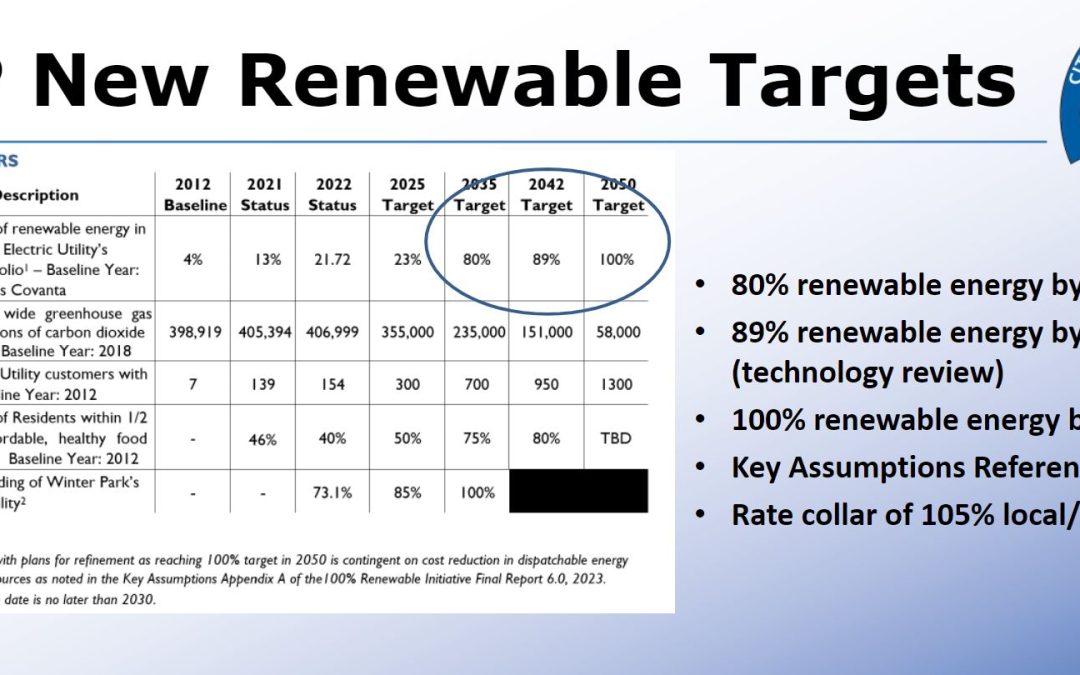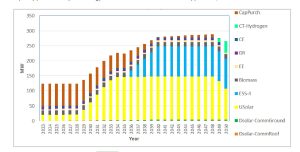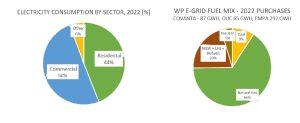City aims for 80% renewable electricity by 2035
The plan calls for the city to purchase 100% of its electricity from renewable sources by 2050
Feb. 2, 2024
By Beth Kassab
City Commissioners recently signed off on a plan to steadily increase the supply of renewable energy it purchases to light homes and businesses until it ultimately reaches 100% in about 25 years.
Winter Park is one of a dwindling number of cities that owns its electric utility, which means it has the power to choose where to purchase its energy.
Mayor Phil Anderson said the plan allows Winter Park to purchase more solar energy without increasing costs for utility customers. That’s because the cost of undergrounding powerlines in the city is already built into electric rates and as that project ends by 2030, the idea is to use that portion of the budget for more renewables.
“I came from being a skeptic to appreciating that we have an amazingly run electric utility and I’m looking at it and saying, ‘Yeah, we can do this,'” Anderson said during the meeting. “This is one of the biggest decisions that the city gets to make.”
Today natural gas makes up the bulk of the city’s power supply, which is common across Florida utilities. But the city is hoping to move away from fossil fuels into more solar and, eventually hydrogen combustion turbines.
The hydrogen option is expensive today, but the city is banking on a general principal of new technology — a decrease in cost over time.
The plan, which commissioners approved last month, calls for 80% renewable energy by 2035 with an increase to 89% by 2042. If the forecast holds, the supply will reach 100% renewables by 2050.
During the debate over electric vs. gas-powered leaf blowers at a special commission meeting last week, some resident accused the city of focusing on the singular devices without committing to a larger effort toward renewable energy.
Commissioner Todd Weaver, who is one of the leading environmental advocates on the board, noted the new push toward rewewables.
“Over the last seven years some of us up here, even before we were elected, considered a sustainability action plan,” he said.
WinterParkVoiceEditor@gmail.com




Give the option to the customer. If the individual customer wants to pay for premium green electricity offer it. The expense to underground power once completed should not be diverted to more expensive green electricity without customer approval. It should be given back to the customers. You could offer customers to buy what ever premium or standard electric power the customer desires.
When a true alternative power source that is revolutionary arrives you won’t have to subsidize it.
When I voted for the referendum for Winter Park to take over the power service and underground power lines it didn’t include paying a premium for more expensive electricity.
Are there any residents that wish to overpay for their utilities? Surely we all expect to pay the best price? I completely agree with “Give an Option”. When I voted for Winter Park to take over the power service and underground the power lines, it didn’t include paying a premium for more expensive electricity. In fact, I think everyone who voted for it thought that once the lines were completely underground and the infrastructure was updated, we would all end up paying less for utilities because we were cutting out the middle man. I for one believed the “profits” for this would stay in WP… possibly my share in my own pocket. Who is profiting financially from this unexpected policy?
Ok, as a starting point, their renewables plan will cost Winter Park electric customers over $5 million a year to overpay for power. Can’t wait for the next thoughtful installment!
According to the mayor this is one of the “biggest decisions the city” gets to make. They blew it. The electric utility customers are paying for the undergrounding. When completed, the rates should be reduced OR that sum of money should be used for the benefit of all residents. Buying inefficient solar at higher rates than fossil fuel is dumb. The amount of fossil fuel energy needed to produce 1 solar panel offsets any theoretical reducing of carbon from using solar. Why should WP Electric customers pay more for energy?
Time for new decision makers.
Solar energy is the least expensive source of electric power. It is also the fastest-growing energy sector in the world. The City is fortunate to be able to purchase power from any available source. Currently, we pay about half the rate for solar that we pay for any fossil fuel source. This will continue, as FPMA and other sources are increasingly closing coal plants in favor of less impactful renewables. Winter Park has been among the bottom 2 in electric rates to its customers of power suppliers in 3 counties and will continue due to the recent plan passed by the City Commission. Without raising rates, Winter Park Electric Utility will serve its customers well into the future, while providing power using increasing amounts of renewables as the years pass.
“Currently, we pay about half the rate for solar that we pay for any fossil fuel source.”
Why not buy all solar for our current energy needs? Why are we buying ANY power generated from fossil fuels if it is double the price of solar? Shouldn’t WP residents get the best rates?
Todd is correct! I enthusiastically approved the city’s first solar power contract several years ago when I was on the commission. The city has now committed to up to 30MW of continuous power (whenever the sun shines) from three utility scale solar fields coming online later this year and next. This is about the maximum we can buy as it approximates our lowest daily load (if we bought more from solar sources, we would be paying for power that was never used on certain days). The pricing for these solar contracts is in the ballpark with power we purchase from natural gas power plants, especially when fuel cost adjustments are taken into consideration. Note that solar power contracts have no fuel cost adjustment. The existing contracts are a good balance of responsible governance both for our electric customers and the environment.
Phil proposes that we buy overpriced power from renewable sources when the undergrounding is complete. The master power contract is up for renewal in 2027. We don’t want our commission committing us to over pay for power on long term contracts, so, it is important to understand where the current commission members and candidates stand on this issue.
Todd’s assertion above that our current solar contracts price electricity at half what we now pay for non-renewable source excludes the cost of fuel charges. These prices are not public for legal reasons but both the solar power and the non-renewable power cost us between $.03 and $.04 per kilowatt-hour delivered to our distribution hubs.
What Todd does not tell you is that any incremental solar power will have to come indirectly from battery storage.
My reading of the city consultant’s study is that electricity from battery storage will dramatically increase or electricity costs to twice the current price paid by Winter Park Electric customers.